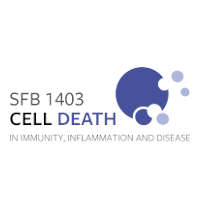Cell Death in Immunity, Inflammation and Disease
Cell death is a fundamental biological process that is critical for the maintenance of tissue homeostasis and plays a central role in host-microbe interactions and pathogen defence in both animals and plants. The recent discoveries of molecularly controlled pathways of lytic cell death, such as necroptosis, pyroptosis and ferroptosis, revealed that cells can select between different modalities of regulated cell death (RCD) and instigated the concept that the consequences of cell death at the tissue and organismal levels are profoundly affected by the way a cell dies.
Dying cells regulate tissue responses by engaging in an intimate cross-talk with bystander cells, yet it remains unclear how the type of cell death determines the outcome of this interaction. While it is now generally accepted that the different RCD pathways have distinct functions, we are only just beginning to understand their respective physiological roles and how these are interlinked with each other. Moreover, the mechanisms determining whether, when and how a cell dies and the effects this exerts on surrounding tissues remain poorly understood.
The overarching goal of this CRC is to understand the mechanisms of regulation and the functional and physiological consequences of diverse forms of RCD in organismal physiology and pathology, with particular focus on immunity, inflammation and host-microbe interactions. A unique aspect of our approach lies in exploring cell death regulation and function in both animals and plants, aiming to allow the cross-fertilisation of the two fields taking advantage of their complementary strengths. By combining multi- and inter-disciplinary approaches, this CRC aims to provide answers to fundamental outstanding questions in cell death research and aspires to make major contributions to the better understanding of the regulation and function of the different forms of RCD in organismal physiology and pathology and the underlying mechanisms.
Research Areas
The projects within SFB1403 study the mechanisms regulating cell death and its impact on immunity, host-microbe interactions, inflammation and disease. The individual projects are grouped into two research areas:
Research Area A: Cell death in inflammation and disease
Work in Research Area A focuses the regulation and function of cell death in organismal homeostasis and disease. Within this research area, 13 projects study how different forms of RCD are regulated, how dying cells are sensed by bystander cells and how this cross-talk triggers distinct tissue responses resulting in tissue repair or inflammation and disease.
Research Area B: “Cell death mechanisms in host defence”
Work in research area B focuses on the mechanisms and function of RCD in host-microbe interactions. Within this research area, 8 research projects study the role of cell death in host defence in both animals and plants, focusing particularly on the mechanisms that govern the regulation and execution of specific types of cell death in response to microbes and how this cross-talk affects pathogen immunity but also symbiotic interactions.
